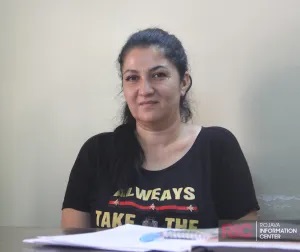What is your name? What is your job and the work of the Armenian Council?
Kohar Khajadourian (co-chair of the Armenian Social Council in Qamishlo): We have been working for seven years for this council. After 3 years the General Council was formed in Heseke, and it was recognized by the Autonomous Administration. On this basis, branches were opened in Qamishlo and Deir ez-Zor, and one will soon be opened in Raqqa.
In general, our work focuses on the social, cultural, and historical issues, such as the history of the displacement of Armenians in the past. When the Armenians came to Syria, Kurdish and Arab people treated and accepted us very well. Now we are working with the Armenian diaspora to learn our roots, history, language, and culture: this is the main work of the Council.
What are your political orientations?
We do not have any political orientation, as I said, our orientations are cultural and social. We are not against anyone, neither regime nor others. We align with all peoples and support the fraternity of peoples. We work for the good of all peoples and also the good of the Armenian people.
There was a conference of Armenian women, what was the purpose of this conference and what is its effect?
That was the first conference of the Armenian Women’s Union. The main objective of this union was to support women to obtain their rights, and to rid them of male domination and outdated customs and traditions in society. The Armenian woman is like any woman in society. There is no difference, she faces a lot of pressure, and we help her to be stronger. We provide women with job opportunities so that they can become more economically self-reliant.
The Armenian Social Council and the Women’s Committee organized this conference. The council is composed of committees, such as the Women’s Committee, the Culture Committee, the Education and Training Committee, the Culture and Art Committee, the Youth Committee, the Finance and Statistics Committee, and we are also working on the census of the Armenian diaspora.
What are the problems facing Armenian women?
This conference was for the Armenian women who were under oppression and tyranny. Among the problems facing Armenian women today are the marriage of minors, deprivation of education, choosing a life partner as well as physical violence, psychological violence, and polygamy.
As we know at this stage there is work on the social contract. What is the role of the Armenians in the social contract?
Before the advent of the Autonomous Administration the Armenian people were not acknowledged, we were known as Assyrians. After that, we as the Armenian people saw that we also have the right to be part of this development. Certainly, we will have a great role in the social contract; we will demand our rights and the rights of language and culture. We must have a role, so decisions are taken as a whole people.
On the Armenian Independence Day, are there relations between you and Armenia at the political, social and cultural levels?
Before the revolution, the Armenian people were a neutral side. As I said, we are part of this homeland but in the past the Armenian people did not join any parties, for example the Baath Party, nor in other politics.
Armenian schools were named in Armenian language, but after the advent of the Baath regime, the names of the schools were changed to Arabic. After the establishment of the Armenian Council here, people began to get involved, and many Armenians took their sides within the military forces, in addition to their involvement in the ranks of the military forces within the Autonomous Administration. We have a military column for Armenian women too.
The number of Armenians in northeastern Syria was approximately about three thousand families before 2011, from Deir Ezzor to the city of Derik, but it is now around 400 families. There are many Armenians who say that their homeland is Armenia, but do not go to Armenia because of the bad economic situation.
We hear about the existence of peace between Turkey, Azerbaijan and Armenia. What is the council’s opinion on this issue?
We do not expect that there will be peace between us and Turkey, especially from the Turkish side, because of their practices towards us. Turkey cannot be trusted, and the choice for peace is theirs to make. They are a brutal and strong state with injustice, and Armenia does not have the necessary strength to recover its lands, but if Russia is honest and considers Armenia a part of it in all respects, then the project of Turkey will fail.
What are the council’s goals for the next 10 years?
The goal of the Armenian Council is to help the Armenian people live a good life, as much as possible, and to have a presence like any other people in all aspects, whether military or cultural. I expect that the next ten years will be better if all minorities and all sects obtain their rights; then the situation can improve on all levels.
